If you trade crypto, security isn’t optional—it’s a necessity. The rise of on-chain surveillance, exchange restrictions, and cyber threats means traders are more exposed than ever. Hackers, governments, and even exchanges themselves are tracking IP addresses, logging user data, and tightening geo-restrictions.
A VPN is one of the simplest yet most effective tools to stay private. By encrypting your connection and masking your location, a VPN keeps prying eyes away from your trades, shields you from potential attacks, and allows you to access exchanges no matter where you are. In a world where privacy is under siege, a VPN isn’t just useful—it’s essential.
In this article, we’ll cover why VPNs matter for crypto traders, key security features to look for, and the best providers to keep your transactions private and unrestricted.
Why Use a VPN for Crypto Trading?
Crypto trading comes with risks, and not just from market volatility. Cyber threats, surveillance, and regulatory restrictions can all put your assets—and your privacy—at risk. A VPN (Virtual Private Network) is a simple yet powerful tool that helps you stay secure while trading.
A VPN encrypts your internet traffic, ensuring that financial transactions remain private and safe from hackers, data trackers, and prying eyes. With phishing scams and exchange breaches on the rise, an extra layer of encryption can mean the difference between security and disaster.
It also helps you bypass geographic restrictions, allowing access to exchanges and platforms that might be blocked in your country. Whether you’re trying to trade on Binance.com from the U.S. or access DeFi platforms restricted in certain regions, a VPN can get you through—while keeping your location hidden.
Your internet service provider (ISP) and third parties may also be monitoring your online activity. Some ISPs throttle bandwidth based on usage patterns, while others log your browsing data. A VPN prevents this by masking your real IP address, ensuring your activity stays private.
And if you’re trading on the go? Public Wi-Fi networks at cafés, airports, or coworking spaces are hotspots for cyber threats. VPN encryption ensures that your data is secure, even on unsecured networks where attackers may be lurking.
Simply put, if you’re trading crypto without a VPN, you’re leaving your data, transactions, and privacy exposed.
Essential VPN Features for Crypto Traders
Not all VPNs are created equal—especially when it comes to crypto trading. The right VPN should prioritize security, speed, and privacy, ensuring that your transactions remain safe without slowing you down. Here are the key features every crypto trader should look for.
Strong Security Protocols
A VPN is only as secure as the protocol it uses. OpenVPN and WireGuard are the gold standards, offering a balance between speed and encryption. WireGuard, in particular, is known for its efficiency, making it ideal for high-frequency traders who need low-latency connections.
Strict No-Logs Policy
If a VPN keeps records of your activity, it defeats the purpose of using one. Look for providers with an audited no-logs policy, ensuring that no browsing history, IP addresses, or transaction details are stored. This is critical in jurisdictions where data retention laws could compromise your privacy.
 A VPN Helps You Stay Secure While Trading. Image via Shutterstock
A VPN Helps You Stay Secure While Trading. Image via Shutterstock Kill Switch Functionality
A kill switch is essential for crypto traders. If your VPN connection drops unexpectedly, a kill switch instantly cuts your internet connection, preventing your real IP address from being exposed. This ensures that exchanges, surveillance firms, or attackers never get a glimpse of your actual location.
Large Server Network & Strategic Locations
The more server locations a VPN has, the more options you have for bypassing geo-restrictions. A strong network also reduces congestion, leading to faster and more stable connections—especially important when executing trades where milliseconds matter.
Fast & Stable Connection Speeds
Trading requires real-time data, and a slow VPN can mean the difference between profit and loss. Look for VPNs that minimize latency and offer high-speed connections, particularly those optimized for WireGuard.
Advanced Encryption Standards
AES-256 encryption is the industry standard, ensuring that your data remains indecipherable even if intercepted. Some VPNs also offer Double VPN (MultiHop) routing, which encrypts your connection through multiple servers for added security.
Multi-Device Support
Crypto traders often operate across multiple devices—PCs, smartphones and tablets. A VPN should support simultaneous connections across multiple platforms, ensuring that your security extends beyond just one device.
With these features in place, you’ll have a VPN that keeps your trades secure without compromising speed or accessibility.
Top VPN Providers for Crypto Trading
Before diving into each of the VPN providers, below is a comparison table of them all, covering both centralised and decentralised options. Each VPN has unique strengths, from enhanced security features to censorship resistance, making them suitable for different types of crypto traders.
| VPN Provider | Type | Pros | Cons | Pricing |
|---|---|---|---|---|
| NordVPN | Centralised | Strong encryption, no-logs policy, WireGuard support, large server network, fast speeds | No free plan, best discounts require long-term commitment | $3.39/month (2-year plan) |
| ExpressVPN | Centralised | RAM-only servers, proprietary Lightway protocol, no-logs policy, works in restrictive regions | More expensive than competitors, limited advanced security features | $4.99/month (2-year plan) |
| Surfshark | Centralised | Unlimited devices, fast speeds, ad-blocking feature, affordable long-term plans | No free version, fewer privacy-focused features than Proton VPN | $2.19/month (2-year plan) |
| Proton VPN | Centralised | Swiss-based privacy protection, audited no-logs policy, Secure Core servers for extra anonymity | Slower speeds on some servers, free version has limited access | $4.49/month (2-year plan) |
| Sentinel dVPN | Decentralised | Censorship-resistant, open-source, pay-as-you-go model, no central authority | Adoption still growing, limited fiat payment options | Variable pricing based on bandwidth usage |
| Mysterium dVPN | Decentralised | Peer-to-peer network, flexible payment options including crypto, multi-hop routing for enhanced privacy | Fewer servers than centralized VPNs, speeds can vary | $3.19/month (2-year plan) |
Nord VPN
NordVPN stands out as a premier choice for crypto traders seeking robust security and privacy. With over 7,000 high-speed servers in 113 countries, it offers extensive global coverage, ensuring reliable and swift connections.
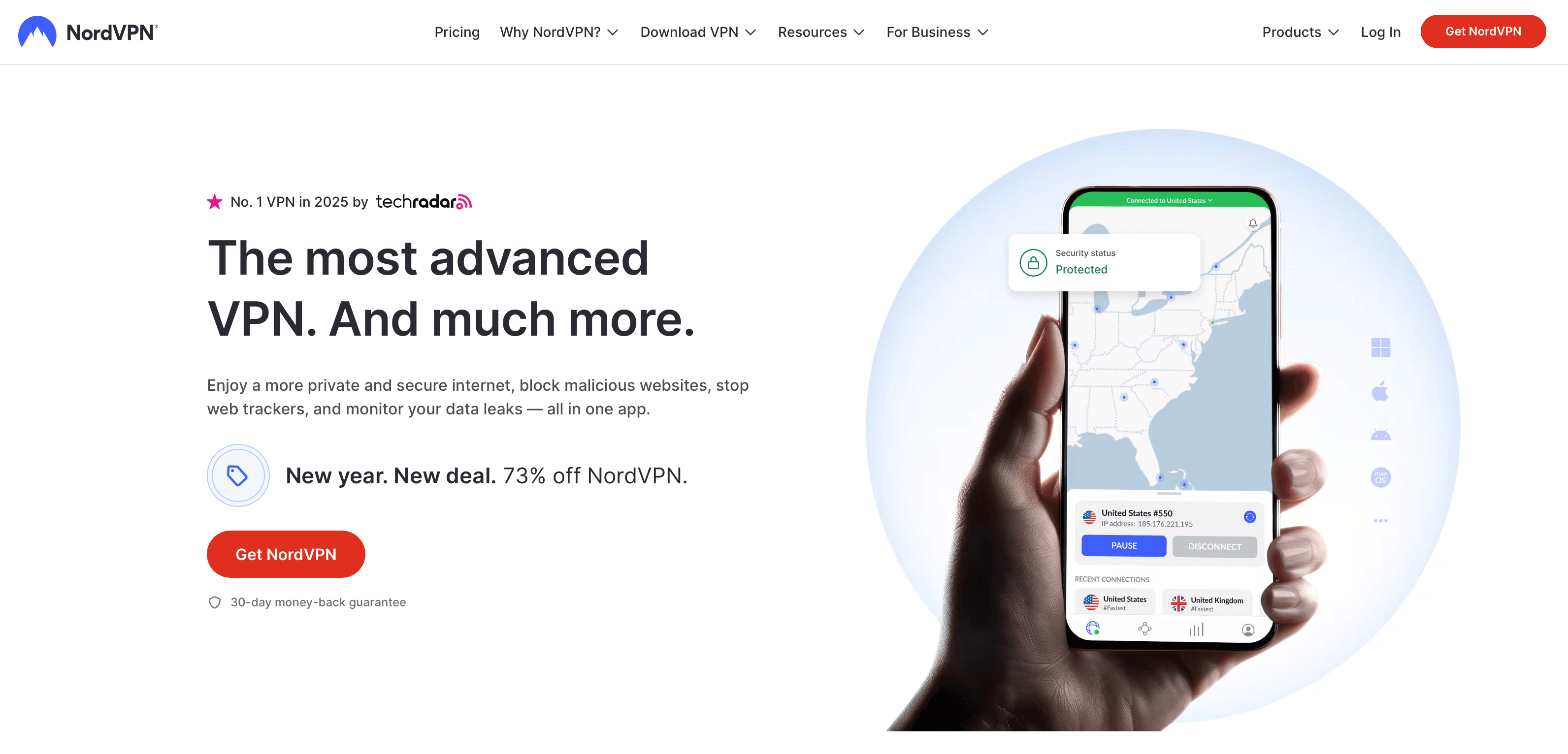 NordVPN Homepage. Image via NordVPN
NordVPN Homepage. Image via NordVPNFeatures:
- Advanced Security Protocols: NordVPN employs top-tier encryption standards, including the proprietary NordLynx protocol, which is based on WireGuard technology, providing enhanced speed and security.
- Strict No-Logs Policy: Independently audited, NordVPN guarantees that user activities are not recorded, ensuring complete privacy.
- Kill Switch Functionality: This feature automatically disconnects your device from the internet if the VPN connection drops, preventing any accidental data exposure.
- Double VPN and Obfuscated Servers: For users requiring additional layers of security, NordVPN offers Double VPN, which routes traffic through two servers, and obfuscated servers to bypass network restrictions.
Benefits:
- Enhanced Privacy: By masking your IP address and encrypting your internet traffic, NordVPN ensures that your crypto trading activities remain confidential and protected from potential cyber threats.
- Access to Global Content: With its vast server network, NordVPN allows users to bypass geo-restrictions, providing access to crypto exchanges and services worldwide.
- User-Friendly Interface: NordVPN's applications are designed for ease of use, making it simple for both beginners and advanced users to secure their online activities.
Pricing:
NordVPN offers flexible subscription plans to suit different needs:
- 2-Year Plan: Priced at $3.39 per month, billed as a single payment of $81.36.
- 1-Year Plan: Available at $4.99 per month, totaling $59.88 annually.
- 1-Month Plan: For those preferring short-term commitment, it's available at $12.99 per month.
All plans come with a 30-day money-back guarantee, allowing users to try the service risk-free.
Surfshark
Now, let's delve into Surfshark, a VPN provider that has garnered attention for its robust features and affordability.
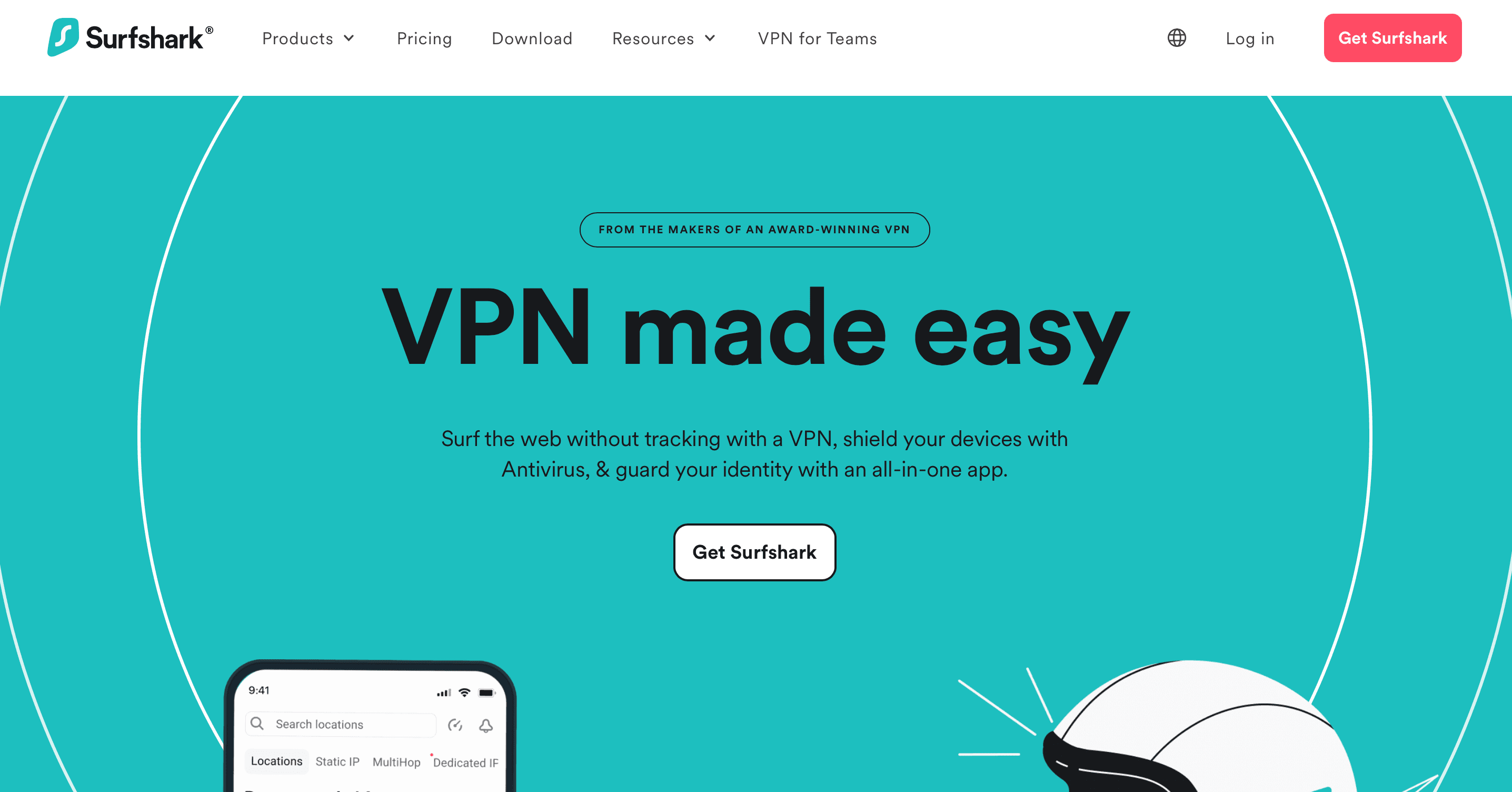 Surfshark Homepage. Image via Sufrshark
Surfshark Homepage. Image via SufrsharkFeatures:
- Unlimited Device Connections: Protect all your devices simultaneously without any limitations.
- Extensive Server Network: Access over 3,200 servers across 100 countries, ensuring a reliable and fast connection wherever you are.
- Advanced Security Protocols: Utilizes industry-leading encryption standards and supports modern protocols like WireGuard, OpenVPN, and IKEv2.
- CleanWeb: Blocks ads, trackers, and malicious websites, providing a cleaner and safer browsing experience.
- MultiHop (Double VPN): Route your traffic through two different VPN servers for an added layer of security.
- Camouflage Mode: Obfuscates your VPN traffic, making it difficult for even your ISP to detect that you're using a VPN.
- NoBorders Mode: Enables usage in regions with strict internet censorship by detecting network restrictions and offering optimized servers.
Benefits:
- Comprehensive Security: With features like MultiHop and CleanWeb, your online activities are well-protected against various cyber threats.
- Global Accessibility: The extensive server network allows you to bypass geo-restrictions and access content from around the world.
- User-Friendly Experience: The intuitive interface and unlimited device connections make it easy to secure all your devices without hassle.
- Enhanced Privacy: Camouflage Mode and a strict no-logs policy ensure that your online actions remain confidential.
Pricing:
Surfshark offers competitive pricing plans to suit different needs:
- Monthly Plan: Priced at $15.45 per month.
- 1-Year Plan: Available at $3.19 per month, billed annually.
- 2-Year Plan: and The most cost-effective option at $2.19 per month, billed every two years.
Each plan comes with a 30-day money-back guarantee, allowing you to try the service risk-free.
ExpressVPN
ExpressVPN is renowned for its robust security features and user-friendly interface, making it a top choice for crypto traders seeking a reliable VPN service.
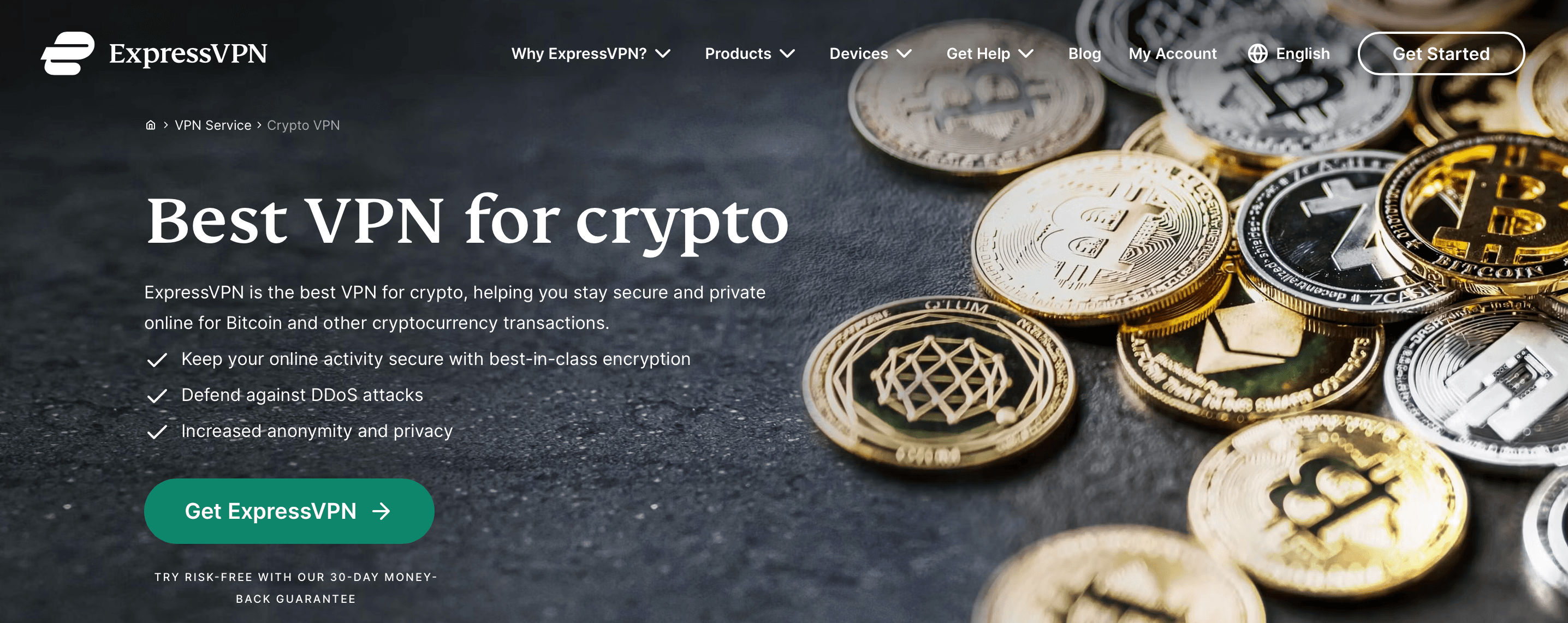 ExpressVPN Homepage. Image via ExpressVPN
ExpressVPN Homepage. Image via ExpressVPNFeatures:
- Global Server Network: With servers in 105 countries, ExpressVPN offers extensive global coverage, allowing users to connect from virtually anywhere.
- Lightway Protocol: This proprietary protocol enhances connection speeds and reliability, ensuring swift and stable access to crypto trading platforms.
- TrustedServer Technology: Operating on RAM-only servers, ExpressVPN ensures that all data is wiped with every reboot, bolstering user privacy.
- MediaStreamer: A Smart DNS feature that enables VPN capabilities on devices that do not natively support VPNs, such as certain smart TVs.
Benefits:
- High-Speed Connections: ExpressVPN's optimized servers provide fast and consistent speeds, crucial for executing timely crypto trades.
- Strong Security Measures: Utilizing AES-256 encryption and a strict no-logs policy, ExpressVPN ensures that your trading activities remain confidential.
- Bypass Geo-Restrictions: The extensive server network allows users to access crypto exchanges and services that may be restricted in certain regions.
- Multi-Platform Support: Compatible with a wide range of devices and operating systems, including Windows, macOS, iOS, Android, and Linux.
Pricing:
ExpressVPN offers several subscription plans to accommodate different user needs:
- 1-Month Plan: Priced at $12.95 per month.
- 1 Year Plan: The most cost-effective option at $6.67 per month, billed annually.
- 2 Year Plan: Available at $4.99 per month, billed every six months.
All plans come with a 30-day money-back guarantee, allowing users to try the service risk-free.
Proton VPN
Proton VPN, developed by the Swiss company Proton AG—the same team behind Proton Mail—offers a robust and privacy-focused VPN service. Operating from Switzerland, Proton VPN benefits from the country's strong privacy laws, ensuring user data remains protected.
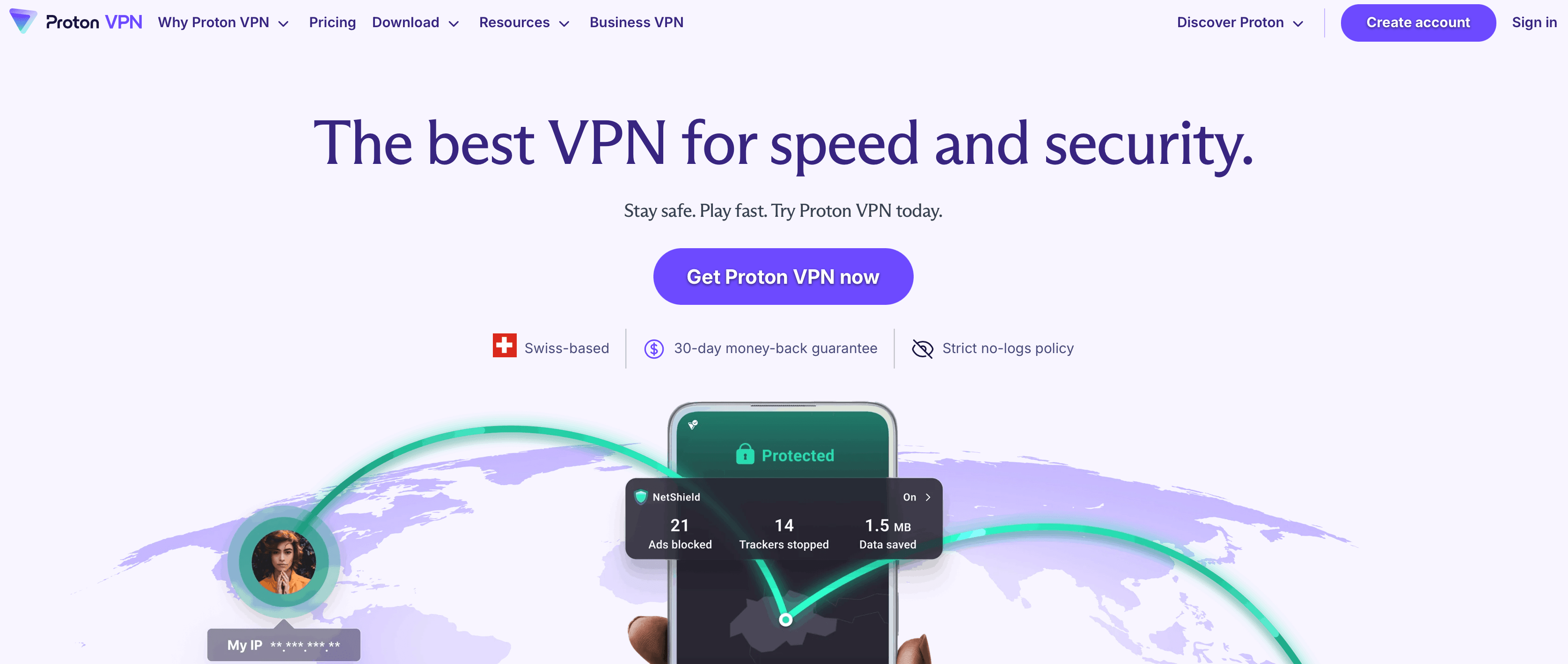 Proton VPN Homepage. Image via ProtonVPN
Proton VPN Homepage. Image via ProtonVPNFeatures:
- Strong Encryption and Protocols: Proton VPN employs AES-256 encryption and supports multiple protocols, including OpenVPN, IKEv2, and WireGuard, ensuring secure and reliable connections.
- No-Logs Policy: Committed to user privacy, Proton VPN adheres to a strict no-logs policy, which has been independently audited to verify that no user activity is recorded.
- Secure Core Servers: For enhanced security, Proton VPN offers Secure Core servers that route traffic through multiple servers in privacy-friendly countries, providing additional protection against network-based attacks.
- Open Source and Audited: All Proton VPN applications are open source and have undergone independent security audits.
Benefits:
- Enhanced Privacy: Operating under Switzerland's stringent privacy laws, Proton VPN ensures that user data is safeguarded against external requests.
- Unlimited Bandwidth: Proton VPN provides unlimited bandwidth, allowing users to browse, stream, and download without restrictions.
- Global Server Network: With servers in over 110 countries, users can access content worldwide, bypassing geo-restrictions effectively.
Pricing:
Proton VPN offers a range of plans to accommodate different user needs:
- Free Plan: Includes access to servers in the Netherlands, Japan, Romania, Poland, and the US, with no data limits.
- Paid Plans:
- 1-Month Plan: Priced at $9.99 per month.
- 1-Year Plan: Available at $4.99 per month, billed annually.
- 2-Year Plan: The most cost-effective option at $4.49 per month, billed annually.
- 1-Month Plan: Priced at $9.99 per month.
Decentralized VPNs
Decentralized VPNs (dVPNs) have emerged as a compelling alternative to traditional VPN services. Unlike their centralized counterparts, dVPNs operate on a peer-to-peer network of independent nodes, eliminating the single point of control inherent in traditional VPNs. This decentralized structure offers several notable advantages:
- Enhanced Privacy and Anonymity: By routing your internet traffic through multiple independent nodes, dVPNs make it significantly more challenging for any single entity to monitor or log your online activities. This multi-hop routing ensures that no central authority has access to your complete data trail, thereby bolstering user privacy.
- Censorship Resistance: The decentralized nature of dVPNs makes them inherently resistant to censorship. Without a central server to target, it's considerably more difficult for governments or other entities to block access to the network, ensuring uninterrupted internet access even in regions with strict censorship laws.
- Improved Security: Traditional VPNs can be vulnerable due to their centralized servers, which, if compromised, can expose user data. In contrast, dVPNs distribute data across a network of nodes, reducing the risk of a single point of failure and enhancing overall security.
- Transparency and Trust: Many dVPN projects are open-source, allowing for public scrutiny of their codebases. This transparency fosters trust, as users can verify the absence of malicious code or backdoors, a level of assurance often not available with proprietary VPN services.
Let’s have a look at some of the best dVPN options out there.
Sentinel Shield dVPN
Sentinel is a decentralized VPN (dVPN) framework that enables individuals to establish their own VPNs without relying on centralized entities. Unlike traditional VPNs, Sentinel operates through a network of independent nodes, enhancing user privacy and security. A standout dVPN of the network is the Sentinel Shield dVPN.
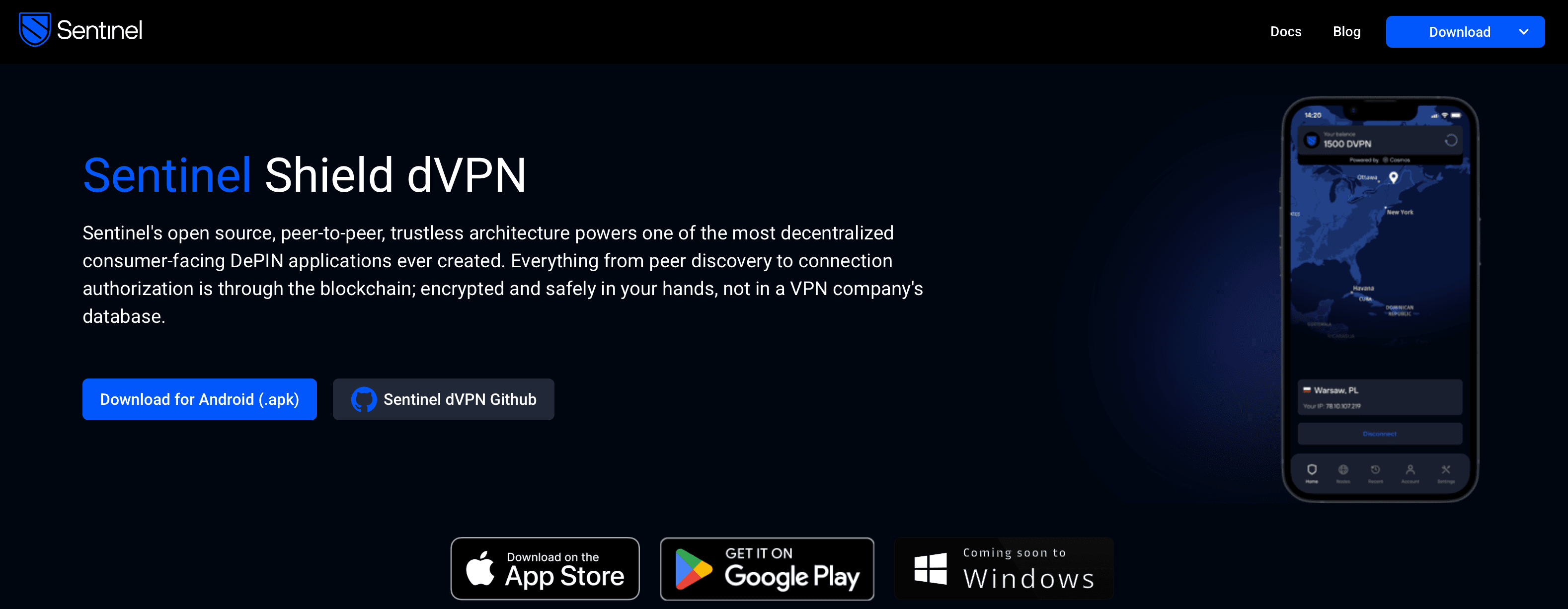 Sentinel Shield dVPN Homepage. Image via Sentinel
Sentinel Shield dVPN Homepage. Image via SentinelFeatures:
- Decentralized Network: Sentinel's architecture comprises numerous independent nodes, eliminating the need for a central authority and reducing the risk of data breaches.
- Proof of Bandwidth Protocol: This protocol ensures that bandwidth sharing is verifiable and transparent, fostering trust among users and node operators.
- Open-Source Transparency: Being open-source, Sentinel allows for community audits, ensuring that the code is free from vulnerabilities and backdoors.
- Relay Network: Sentinel's relay system enables users to route their connections through multiple nodes, enhancing anonymity and making it challenging for any single entity to trace user activity.
Benefits:
- Enhanced Privacy: The decentralized nature ensures that no single entity has access to user data, mitigating the risk of unauthorized data collection.
- Security: With its Proof of Bandwidth Protocol and open-source code, users can trust the integrity and security of the network.
- Censorship Resistance: The distributed node framework makes it difficult for authorities to censor or shut down the network, ensuring uninterrupted access.
Pricing:
Sentinel offers flexible payment models:
- Subscription-Based: Users can opt for traditional subscriptions, paying a fixed amount for a set period of access.
- Pay-As-You-Go: Alternatively, users can pay based on the amount of bandwidth consumed, allowing for more granular control over expenses.
Payments can be made using various cryptocurrencies, and in some cases, fiat currencies.
Mysterium VPN
MysteriumVPN distinguishes itself as a decentralized VPN service, offering users enhanced privacy and security through its unique architecture.
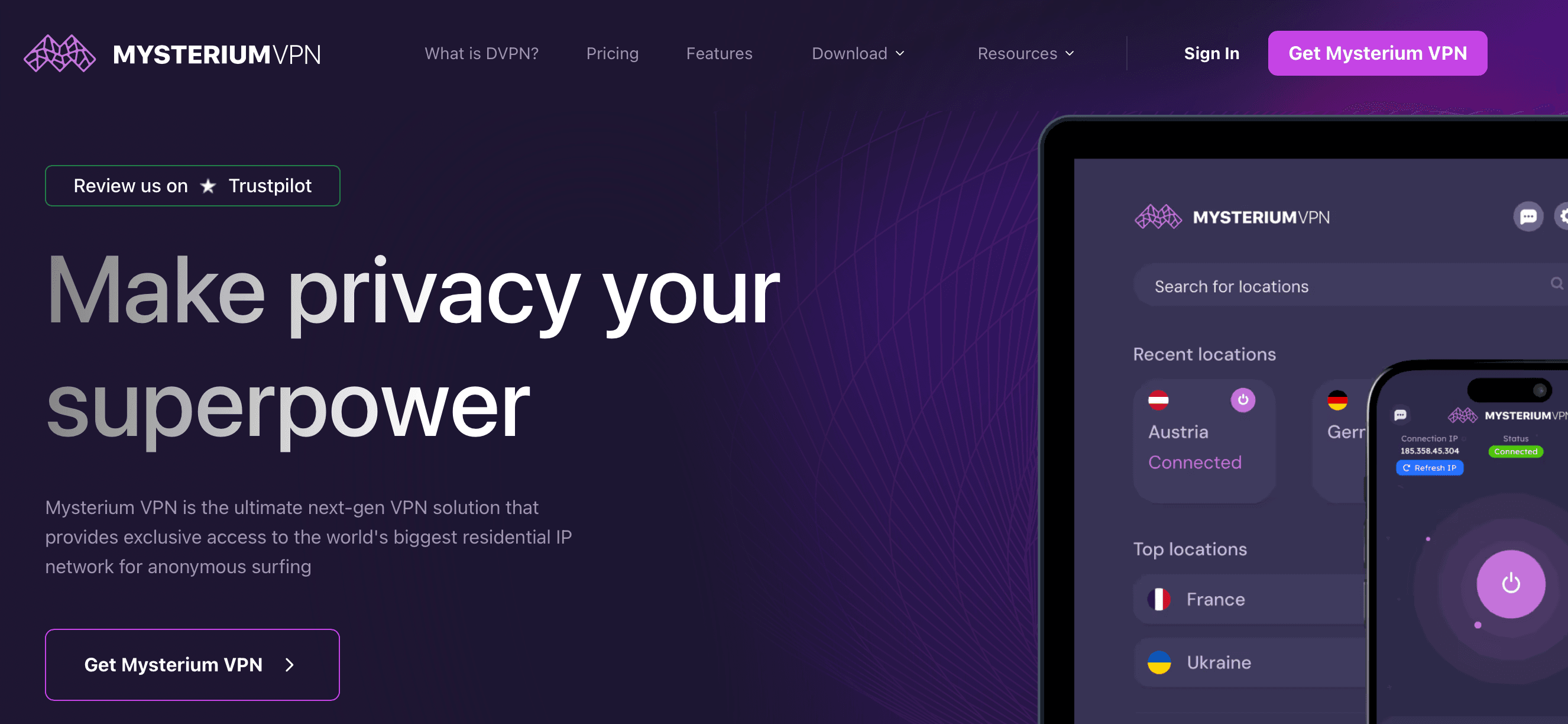 MysteriumVPN Homepage. Image via MysteriumVPN
MysteriumVPN Homepage. Image via MysteriumVPNFeatures:
- Decentralized Network: Unlike traditional VPNs, Mysterium operates on a decentralized network powered by a global community, providing access to over 20,000 residential IP addresses across 135+ countries.
- Military-Grade Encryption: Utilizes the WireGuard protocol to ensure high-speed connections without compromising on security.
- Unlimited IP Rotation: Allows users to change their IP address at will, enhancing anonymity and making it difficult for trackers to monitor online activities.
- No-Logs Policy: Commits to a strict no-logs policy, ensuring that user activities are not recorded or stored.
- Multi-Device Support: Supports up to six simultaneous connections, allowing users to protect multiple devices under a single subscription.
Benefits:
- Enhanced Privacy: The decentralized nature of Mysterium VPN reduces the risk of data breaches associated with centralized servers, offering a higher level of privacy.
- Bypass Censorship: With a vast network of residential IPs, users can effectively bypass geo-restrictions and access content from around the world.
- Improved Security: Military-grade encryption and a strict no-logs policy ensure that user data remains confidential and secure.
Pricing:
Mysterium VPN offers flexible pricing plans to cater to different user needs:
- Monthly Plan: $9.99 per month.
- 6-Month Plan: $6.85 per month, billed every six months at $41.10.
- 1-Year Plan: $5.14 per month, billed annually at $61.68.
- 2-Year Plan: $3.19 per month, billed biennially at $76.56.
Each plan includes a 7-day money-back guarantee, allowing users to try the service risk-free.
Security Best Practices for Crypto Traders
Using a VPN is an important step in securing your crypto trading activities, but it’s only part of a broader security strategy. True privacy and protection require a combination of proper VPN configuration, additional security measures, and disciplined trading habits. Here’s how to stay ahead of potential threats.
Optimizing Your VPN for Maximum Security
A VPN is only as effective as its setup. To ensure the highest level of protection:
- Enable the Kill Switch – This feature cuts your internet connection if the VPN drops, preventing your real IP address from being exposed.
- Use Secure Protocols – Stick to WireGuard or OpenVPN for the best combination of speed and security.
- Rotate Server Locations – Frequently changing server locations adds another layer of privacy, making it harder for anyone to track your activities.
- Avoid Free VPNs – Many free VPNs log user activity or have weak security, which undermines the purpose of using one in the first place.
Additional Security Layers
A VPN should always be part of a larger security approach, not the sole solution. To further protect your accounts and funds:
- Enable Two-Factor Authentication (2FA) – Always use 2FA on exchanges and wallets.
- Use Strong, Unique Passwords – Use complex passwords to minimize the risk of credential theft.
- Trade on Private Networks – Avoid using public Wi-Fi for crypto trading, even with a VPN. A mobile hotspot or secured home network is always the safer choice.
Common Security Pitfalls to Avoid
Even with a VPN, there are mistakes that can expose your data:
- Relying Solely on a VPN – A VPN protects your privacy, but it won’t stop phishing scams, malware, or exchange hacks. Always verify website URLs and never click on unsolicited links.
- Leaving Funds on Centralized Exchanges – Even with strong security, no exchange is immune to hacks or sudden regulatory actions. Funds left on exchanges are always at risk.
That's the reason why self-custody remains the most secure way to protect your assets. If you’re seeking reliable options for storing your holdings offline, check out some great deals on hardware wallets available on the Coin Bureau Deals page.
Safe Trading Habits
- Use a Dedicated Device for Trading – Keeping crypto transactions separate from everyday browsing reduces exposure to malware and tracking.
- Withdraw to Cold Storage – Hardware wallets like Ledger or Trezor are the safest way to store crypto long-term.
- Regular Security Audits – Reviewing and updating passwords, VPN configurations, and security settings on a routine basis ensures you stay ahead of evolving threats.
VPNs and Decentralized Exchanges
Decentralized exchanges (DEXs) have become the go-to platforms for traders looking to maintain control over their assets while avoiding the risks associated with centralized exchanges. However, using a VPN with a DEX raises some important considerations, from privacy protection to performance trade-offs.
 Most DEX’s Don’t Have Regional Restrictions. Image via Shutterstock
Most DEX’s Don’t Have Regional Restrictions. Image via ShutterstockCompatibility with Major DEXs
Unlike centralized exchanges, most DEXs do not require KYC and generally do not restrict users based on location. This means that VPN compatibility is usually seamless, as there are no login credentials or IP tracking systems that can interfere with access.
However, some blockchain-based platforms and DeFi services may still enforce regional restrictions. For instance, dYdX has blocked U.S. users from accessing certain features. In such cases, a VPN can help bypass these restrictions by allowing traders to connect from a permitted jurisdiction.
Privacy Considerations
One of the biggest advantages of using a DEX is maintaining financial privacy, as trades happen directly from self-custody wallets without the need for an account. However, without a VPN, your IP address is still exposed to the platform and potentially to on-chain analytics firms monitoring transactions.
Using a VPN ensures that:
- Your real IP address is hidden when connecting to the DEX interface.
- Your trading activity remains private from ISPs and network surveillance.
- You mitigate potential tracking from DEX-related APIs and third-party analytics tools.
For even greater privacy, some traders combine a VPN with privacy-focused browsers like Brave or use Tor over VPN, though this may affect speed.
Performance Impact
One concern when using a VPN with a DEX is potential latency issues. Since trading on a DEX involves signing transactions with a self-custody wallet and broadcasting them to the blockchain, a slow or unstable VPN connection can result in:
- Delays in submitting transactions, potentially leading to slippage or missed trade opportunities.
- Longer load times for DEX interfaces, especially when connecting to RPC nodes.
- Increased failure rates for high-speed trading strategies, such as arbitrage or flash swaps.
To minimize performance issues:
- Use a VPN with high-speed, low-latency servers optimized for trading.
- Choose WireGuard or OpenVPN (UDP) protocols for faster connections.
- Connect to a VPN server near the blockchain nodes you interact with, reducing request time.
Setting Up Your VPN for Crypto Trading
Using a VPN for crypto trading is only effective if it’s properly configured. A poorly set-up VPN can leak your real IP, slow down transactions, or even trigger security checks on exchanges. To ensure maximum security, privacy, and performance, here’s how to configure your VPN the right way.
 Configuring Your VPN The Right Way is Crucial. Image via Shutterstock
Configuring Your VPN The Right Way is Crucial. Image via ShutterstockStep-by-Step Configuration Guide
- Choose a Reliable VPN – Opt for a no-logs VPN with strong encryption, fast speeds, and a wide server network. NordVPN, ExpressVPN, and Proton VPN are solid centralized options, while Sentinel and Mysterium provide decentralized alternatives.
- Install the VPN Client – Download and install the VPN on all devices used for trading, including desktop, mobile, and tablet.
- Enable Advanced Security Features:
- Kill Switch – Ensures your connection is blocked if the VPN drops.
- DNS Leak Protection – Prevents your ISP from seeing your web activity.
- Kill Switch – Ensures your connection is blocked if the VPN drops.
Optimal Settings for Trading
For the best experience, adjust the following VPN settings:
- Protocol Selection – Use WireGuard or OpenVPN (UDP) for the best balance of speed and security.
- Server Location – Choose a VPN server geographically close to the exchange’s servers to minimize latency.
- Dedicated IP Address (if available) – Some VPNs offer dedicated IPs to reduce CAPTCHAs and security triggers on exchanges.
Legal and Compliance Considerations
While VPNs provide an effective way to enhance privacy and bypass restrictions, they exist in a legal gray area when used for financial transactions. Many exchanges, jurisdictions, and regulators have varying policies on VPN usage, making it essential for crypto traders to understand the potential risks and limitations.
VPN Usage Regulations
VPN legality varies by country, with some nations actively restricting or banning VPNs due to censorship and regulatory concerns. Countries with strict VPN laws include:
- China – Only government-approved VPNs are allowed, and unauthorized VPN use can result in fines.
- Russia – VPNs that do not comply with state monitoring regulations are banned.
- United Arab Emirates – VPN usage is permitted, but using one to access restricted services can lead to penalties.
- Turkey & Iran – Authorities monitor VPN use, and access to many VPN services is blocked.
In most Western countries, including the United States, Canada, and the European Union, VPNs are legal. However, using them to bypass financial regulations could still violate platform policies.
Trading Platform Policies
Crypto exchanges have different stances on VPNs, often based on regulatory compliance requirements. However with most exchnages enforcing KYC, most actively block or restrict accounts that log in through VPNs.
- Exchanges that Restrict VPN Use – Coinbase, Kraken, Gemini, and some regulated platforms may flag VPN connections and require identity verification.
- DEXs and DeFi Platforms – Most decentralized exchanges do not block VPNs, but front-end interfaces (such as dYdX) have imposed geo-restrictions in certain regions.
Exchanges track user logins and may flag accounts that frequently change IP addresses. If a VPN connection is detected, users might face extra verification steps or withdrawal delays.
Regional Restrictions
Some jurisdictions restrict access to crypto trading platforms based on location, making a VPN an essential tool for traders in banned or restricted regions. Examples include:
- U.S. Residents Blocked from Binance.com – Users in the United States are forced to use Binance.US, a separate platform with limited assets and higher fees.
- China’s Crypto Ban – China has banned crypto trading, making access to global exchanges difficult without a VPN.
While a VPN can help bypass these restrictions, users should be aware that some exchanges use geo-blocking mechanisms at the KYC level, meaning bypassing them may not always be possible.
Compliance Requirements
Using a VPN does not exempt traders from regulatory obligations such as Know Your Customer (KYC). Even with a VPN:
- Exchanges may still require KYC verification before allowing deposits and withdrawals.
- Financial regulators can track blockchain transactions, even if access is obfuscated via a VPN.
- Trading on a restricted platform using a VPN could violate terms of service, leading to potential account suspension or loss of funds.
Common Troubleshooting Issues
Even the best VPNs can encounter issues that impact connectivity, speed, and usability when trading crypto. If your VPN is causing delays or access problems, it’s important to diagnose and resolve these issues quickly to avoid disruptions in trading. Below are some of the most common VPN-related problems and how to fix them.
Common Connectivity Issues
VPN Won’t Connect
- Check your internet connection – Ensure your base internet connection is working before troubleshooting the VPN.
- Try a different server – Some VPN servers may be overloaded or blocked by your ISP. Switching to another location can resolve the issue.
- Update your VPN software – Using an outdated VPN version may cause compatibility issues.
- Disable conflicting software – Firewalls or antivirus programs may interfere with the VPN connection. Temporarily disable them and try reconnecting.
- Change the VPN protocol – If your VPN is stuck connecting, try switching from OpenVPN to WireGuard or IKEv2 in your settings.
VPN Disconnects Frequently
- Enable the Kill Switch – If your VPN drops, a kill switch prevents data leaks by blocking internet access until the VPN reconnects.
- Change the protocol – Some networks throttle or block certain VPN protocols. Switching from TCP to UDP or using WireGuard can improve stability.
- Use a wired connection – Wi-Fi networks can be unstable. If possible, use a wired ethernet connection for a more reliable VPN experience.
Speed Optimization
Slow VPN Speeds While Trading
- Choose a nearby server – The closer the VPN server, the lower the latency. Select a server geographically close to the exchange’s data center for optimal speed.
- Use WireGuard or OpenVPN (UDP) – WireGuard is generally faster than OpenVPN, while UDP is preferable over TCP for trading.
- Disable extra security features – Features like Double VPN can significantly slow down connections. Use them only when necessary.
- Check for ISP throttling – Some ISPs throttle VPN traffic. Running a speed test with and without the VPN can help diagnose this issue.
Platform-Specific Solutions
Exchange Blocking VPN Access
- Try a different VPN server – Some exchanges blacklist specific IP ranges. Switching to another server may bypass the restriction.
- Use an obfuscated server – Some VPNs offer stealth or obfuscated servers, which disguise VPN traffic as regular HTTPS traffic to avoid detection.
- Get a dedicated IP address – Some exchanges flag frequent IP changes as suspicious. A dedicated IP VPN can provide a more consistent connection.
Closing Thoughts
A VPN is one of the most effective tools for securing crypto trades, masking your IP address, encrypting your connection, and bypassing restrictions. Not all VPNs offer the same level of protection, and choosing one with a strict no-logs policy, strong encryption, and fast servers is crucial. While centralized options like NordVPN and Proton VPN provide reliability and ease of use, decentralized alternatives like Sentinel Shield dVPN and Mysterium offer greater resistance to censorship.
Proper configuration is just as important as choosing the right provider. Enabling a kill switch, using secure protocols, and maintaining a consistent server connection help avoid leaks and security triggers on exchanges. While VPNs enhance privacy, they are only part of a broader security strategy that includes secure wallets, strong authentication, and careful trading habits.
As regulatory scrutiny increases, privacy tools will become even more essential. VPNs will remain a key safeguard, but traders must stay ahead by integrating additional security measures. A well-protected setup ensures that your transactions remain private and your assets secure in an increasingly monitored digital landscape.





